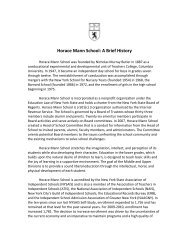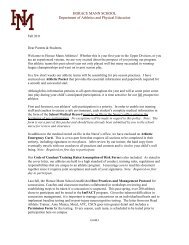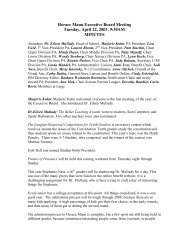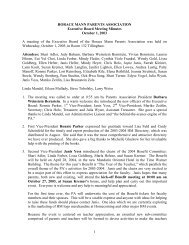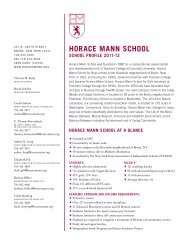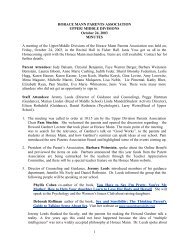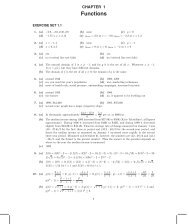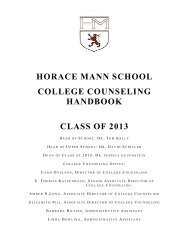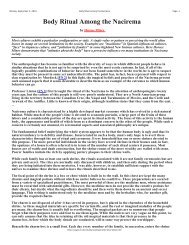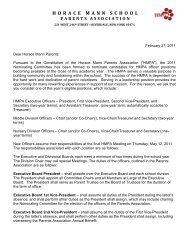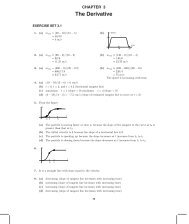ATHLETIC HANDBOOK - Horace Mann School
ATHLETIC HANDBOOK - Horace Mann School
ATHLETIC HANDBOOK - Horace Mann School
You also want an ePaper? Increase the reach of your titles
YUMPU automatically turns print PDFs into web optimized ePapers that Google loves.
<strong>Horace</strong> <strong>Mann</strong> Athletics Page 27<br />
Sophomore Year<br />
• As you continue working on your skills, teamwork, and physical training, start<br />
thinking about your role on the team. If you were a coach, what qualities<br />
would you like to see in a player's participation and attitude? What makes for<br />
a good team leader or captain? College coaches prize attitude and leadership,<br />
in addition to talent.<br />
• During January and February, think about summer programs. If you play<br />
more than one sport, which one or two are most important to you? Ask your<br />
coach(es) if they think you might play in college. If your coach(es) think you<br />
might play a "team sport" in college, which camps, showcases, travel teams,<br />
showcase teams, leagues or tournaments would give you the best exposure to<br />
college coaches over the next year?<br />
• If you play an individual sport, what competitions, ranking, or records should<br />
you aim for over the summer?<br />
• What physical goals do you have: speed, strength, size, cardiovascular fitness,<br />
agility? Ask your coaches to help you establish goals and to suggest work-out<br />
and nutrition regimens to attain your goals.<br />
• Keep your grades up! Being a top athletic recruit could increase your college<br />
options to a degree, but not without strong grades.<br />
Junior Year<br />
• Consider doing a small amount of preparation for the PSAT test just to<br />
become comfortable with the exam and practice a little. That way, the PSAT<br />
will serve as a more accurate indicator of your potential on the SAT test.<br />
• If you play a team sport, consider making a video of your play that you can<br />
send to coaches who cannot see you play in person. Most coaches prefer a<br />
recording of whole games or halves, rather than highlights, but check with<br />
your coach. Some of our coaches routinely videotape games and can often<br />
make these available to you.<br />
• Consider playing in showcases, tournaments and camps during the school year<br />
and/or during the following summer. See your coach for suggestions.<br />
• Start compiling an athletic resume. There are samples in the Athletic Office.<br />
• Start the college counseling process in January. Meet with your counselor to<br />
talk about your academic, athletic and personal goals. Create a list of colleges,<br />
with the help of your counselor and your parents. Make sure the list includes<br />
some colleges where your admission would be very likely based on your<br />
academic record alone - whether you become a top athletic recruit or not.<br />
Contact the admissions offices on-line and ask them for information about<br />
the programs that interest you. Send your cover letter and resume to the<br />
coaches at all of the colleges on your initial list.<br />
• Take the SAT in March.<br />
• Visit colleges over spring break of junior year. Be sure to make an<br />
appointment for a tour and information session in the admissions office. Call<br />
or e-mail coaches to make appointments to meet them before or after your<br />
admissions office appointments. Bring an unofficial record of your grades to<br />
date.<br />
• Meet with your counselor after spring break to discuss what you saw and<br />
learned and how you felt about your visits.



